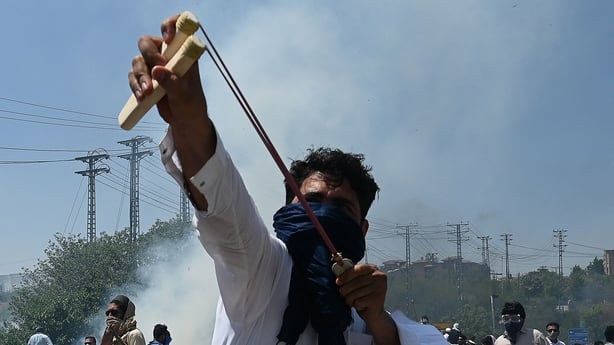Former Pakistan prime minister Imran Khan has been granted bail by Islamabad High Court, after his arrest on political corruption charges this week sparked deadly clashes before being declared illegal.
Mr Khan was manhandled into detention by paramilitary troops at the court on Tuesday, but the Supreme Court later declared the arrest unlawful and demanded the process be "backtracked".
Today, after arriving back at Islamabad High Court in a secure convoy and walking into the building flanked by dozens of police and paramilitaries, he was given bail.
"The court has granted Imran Khan a two weeks interim bail and has directed the authorities not to arrest him in the case," his lawyer Khawaja Harris told reporters afterwards.
Pakistan Tehreek-e-Insaf (PTI) party lawyers gathered in front of the court ahead of the hearing shouted "Khan your devotees are countless" and "the lawyers are alive", as the ousted leader raised a single fist above his head.
But the legal saga seems far from over.
The interior minister has pledged to rearrest Mr Khan, who is involved in a series of legal cases - a frequent hazard for opposition figures in Pakistan - since he was ousted from power last April and launched a campaign of defiance against the military.
General elections are due no later than October, and the former cricket star has accused the shaky incumbent coalition government of supplanting him in cahoots with top generals.
The 70-year-old has also made explosive claims that they puppeteered a November assassination attempt which saw him shot in the leg as he campaigned for snap polls.
Mr Khan was arrested under the orders of Pakistan's top political corruption agency as he arrived for a routine court appearance in the capital.
Two days of chaos followed, with several thousand of his supporters rampaging through cities across the country in protest, setting fire to buildings and blocking roads.
At least nine people died in the unrest, police and hospitals said.
Hundreds of police officers were injured and more than 3,500 people arrested, mostly in Punjab and Khyber Pakhtunkhwa provinces, according to authorities.

Yesterday, Chief Justice Umar Ata Bandial said the arrest was unlawful because it took place on court premises, where Mr Khan had intended to file a bail application.
"Your arrest was invalid, so the whole process needs to be backtracked," he said.
Mr Khan remained in the court's custody overnight under police protection for his own safety until he arrived at Islamabad High Court, where hundreds of security forces were deployed and nearby roads shut.
Islamabad police had issued an emergency order banning all gatherings in the capital city after PTI called for supporters to come together.
Faisal Hussain Chaudhry, a lawyer for Mr Khan, told reporters that further arrests of senior PTI leaders overnight brought the total number to ten.
"The country needs peace but such steps by the government are not helpful," he said.
Despite the ruling on the legality of Mr Khan's arrest, Interior Minister Rana Sanaullah refused to back down yesterday.
"If (Khan) gets bail from the High Court tomorrow, we will wait for the cancellation of bail and arrest him again," Mr Sanaullah told Dunya TV.
Mr Khan has remained wildly popular since being ousted.
His arrest this week came after the army rebuked him for once again repeating allegations they were involved in his assassination attempt.
Pakistani politicians have frequently been arrested and jailed since the country's founding in 1947.
But few have so directly challenged a military that holds significant influence over domestic politics and foreign policy and has staged at least three coups and ruled for more than three decades.

